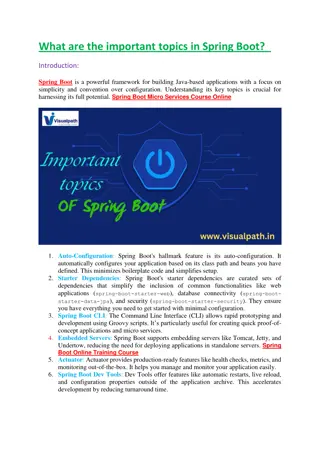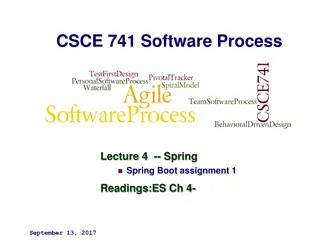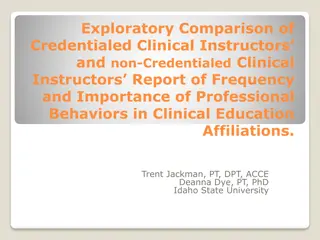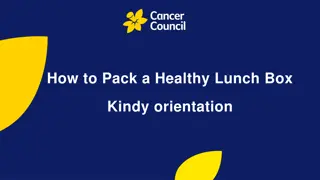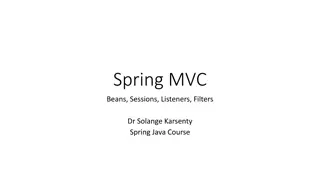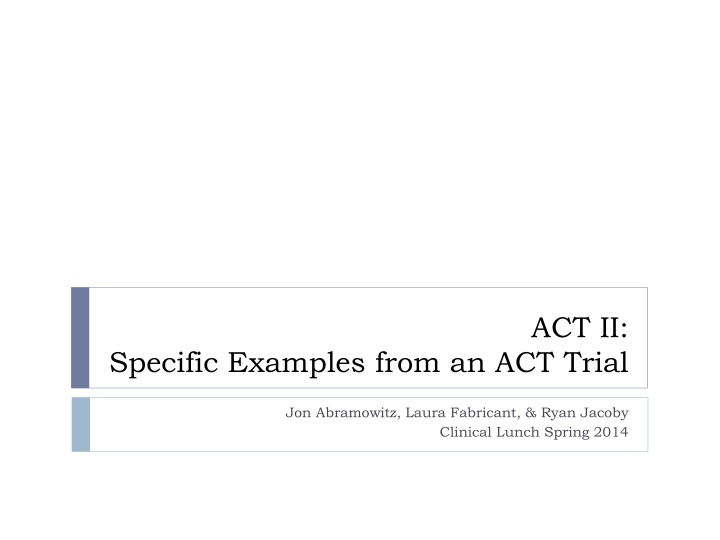
Insights from an ACT Trial: Techniques and Examples
Delve into the principles and techniques of Acceptance and Commitment Therapy (ACT) with specific examples from a clinical trial. Explore how exposure therapy and ACT work together, along with fostering acceptance, defusion, values identification, commitment, and self-observation. Discover how ACT principles can be applied to real-world scenarios, particularly in dealing with OCD patients through willingness to experience internal events and exposure techniques.
Download Presentation

Please find below an Image/Link to download the presentation.
The content on the website is provided AS IS for your information and personal use only. It may not be sold, licensed, or shared on other websites without obtaining consent from the author. If you encounter any issues during the download, it is possible that the publisher has removed the file from their server.
You are allowed to download the files provided on this website for personal or commercial use, subject to the condition that they are used lawfully. All files are the property of their respective owners.
The content on the website is provided AS IS for your information and personal use only. It may not be sold, licensed, or shared on other websites without obtaining consent from the author.
E N D
Presentation Transcript
ACT II: Specific Examples from an ACT Trial Jon Abramowitz, Laura Fabricant, & Ryan Jacoby Clinical Lunch Spring 2014
Overview ACT principles Our study on exposure therapy and ACT Techniques to foster acceptance Techniques to foster defusion Techniques to pursue values Discussion (applying ACT to other problems)
I spend most of my time paying attention to what is happening in the present moment 10 9 8 7 6 5 4 3 2 1 ATTENTION TO PRESENT SCALE I willingly accept my thoughts and feelings even when I don t like them I am clear about what I choose to value in life ACCEPTANCE SCALE I spend 10 10 9 9 8 8 most of my time lost in thought about the past or future 7 7 6 6 5 5 4 4 3 3 2 2 1 I constantly struggle with my thoughts and feelings 1 I don t know what I want from life VALUES IDENTIFICATION SCALE My thoughts tell me how things really are, and determine what I do next I don t manage to act on the things I care about DEFUSION SCALE Deep down, my thoughts and feelings are the real me 1 1 2 2 3 3 4 I see each of my thoughts as just one of many ways to think about things what I do next is up to me 4 5 5 6 I work out what I need to do about the things I care about, and I see it through 6 7 7 8 8 9 9 10 COMMITMENT & TAKING ACTION SCALE 10 1 2 3 4 5 6 7 8 9 10 SELF AS OBSERVER SCALE My thoughts and feelings come and go, but deep down the real me doesn t change
Our Study How did we get interested in ACT? Our study An ACT perspective on OCD: 3 parts Exposure from an ACT framework Similarities and differences (SUDS vs. willingness) Exposure therapy to facilitate the ACT processes
Acceptance Willingness to experience internal events Examples from OCD patients Metaphors and techniques Jerk at the door Chessboard Exposure Habituation vs. fear tolerance
Defusion Distancing and disconnecting from thoughts Seeing thoughts and feelings for what they are, not what they say they are Examples from OCD patients Metaphors and techniques Milk, Milk, Milk Passengers on the bus Imaginal exposure
Passengers on the Bus Metaphor You re the driver and the passengers are your OCD related thoughts, feelings, physiological sensations, etc. The passengers try to direct where the bus goes They are loud and bossy about what you do They quiet down when you do what they want If you drive the bus where you want to go, what will happen? You can allow them to shout and keep your attention focused on where you want to go
Values Choosing what direction one wants life to take (not letting OCD choose the direction life goes) Examples from OCD patients Metaphors and techniques Bull's-eye Moving through a swamp Exposure
BULLS EYE ILLUSTRATION My life is just as I want it to be My life is far from how I want it to be beifr n det jag What do you value? What do you want your life to be about? Work/ Education Leisure What do each of these categories mean to you? In what ways has OCD been getting in the way of living life in the direction of your values? Personal growth/ Health Relationships
Moving through a swamp Swamp = OCD-related inner experiences and triggers Exposure = learning how to handle whatever comes up while still moving forward through swamp Willingness to go into the swamp without resisting (avoiding or using compulsive rituals) Why are we doing this? Getting dirty and muddy but for a purpose Not wallowing in the swamp Things you value are on the other side of the swamp (only way is through it!)
Exposures and values Emotional moves vs. values moves Motivation Anxiety reduction is not an explicit goal Successful outcome = you doing something important to you despite having anxiety
Discussion How could we apply these techniques to other problems? Similarities and differences with other therapies? Questions?










